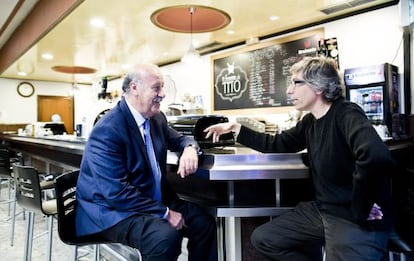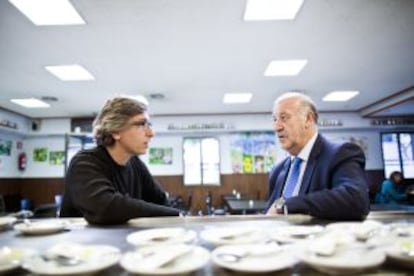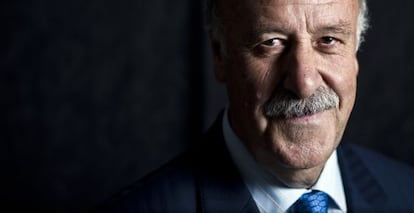Vicente del Bosque: “I prefer caution over senseless euphoria”
The man who led Spain to its first World Cup four years ago talks tactics, humility and crosswords

Few people in Spain have a better understanding of the institution they represent than national soccer squad coach Vicente del Bosque. He’s never going to lose it in an interview or say anything controversial. He is a much-loved figure, an institution himself, and a man who likes life’s simple pleasures, such as taking his dog for a walk when he gets home from work in the evening. There is a twinkle in his eye, and his smile might best be described as wry. He has the air of a figure in a Velázquez painting about him.
He is polite, and despite the pressures that can accumulate around and on him, he never loses his cool. This grace has come in very useful in working with Spain’s leading soccer players. “You should never forget you’re representing your country, so you need to keep your ego under lock and key.” His management style is very hands off, and when he gives orders, he gives the impression that it is the people around him who are actually calling the shots.
You’re representing your country, so you need to keep your ego under lock and key”
Del Bosque was always one of those players who seemed set for a career in management. “I remember when Miljan Miljanic took over as coach at Real Madrid: he brought specialist trainers, and this was also a time when foreigners started to play in the Spanish league, and the game improved as a result. I trained under [Luis] Molowny and [Vujadin] Boskov, and you learn all kinds of things, ways of dealing with the job.” The 1974 World Cup had just finished, and soccer was undergoing a tactical and professional revolution that included the reopening of the Spanish game to foreigners, which saw the arrival of Johan Cruyff, Hugo Sotil, Günter Netzer, and others. “For me the most important thing that happened to the national squad was when Spanish players started to make a name for themselves overseas. Overnight, we lost our inferiority complex; being Spanish did not mean having to keep your head down when you went abroad. For me it was fundamental to be able to call up players who were stars in teams in other countries. I’m thinking for example of Cesc, who at the age of 21 was captain of Arsenal, which was unimaginable decades earlier.”
Del Bosque has been the Spanish coach for six years now, despite having only played at international level himself 18 times. His friends from that era as a player include former Real Madrid teammates such as Mariano García Remón and José Antonio Camacho, who also went on to become coaches. He says he no longer collects press cuttings, and even jokes about not having time to attend award ceremonies: “I think that at times they have invented prizes just to give to us, and then of course you have to go and receive them and be grateful.” He says his father used to keep press cuttings about him when he played at schoolboy level, when he signed for Salamanca, and then when his professional career took off; but when his father, Fermín, died, that was that.

The entire country knows he can’t take his eye off his son Álvaro when he turns up at official events, and his close friends say he never misses picking up the boy, who has Down’s syndrome, from school. He says he doesn’t bother watching much television, and his favorite way of relaxing is doing the crossword: “Sometimes I’ll take one on a trip that I haven’t touched for years.”
Del Bosque is nothing if not diplomatic, but that doesn’t mean he has no critical faculties, and he certainly understands the complexities of managing the national squad. After years of going into the World Cup on a wave of euphoria and then being eliminated in the early rounds, Spain is now the defending champion: little wonder that the pundits have been largely silent. “And that’s the way I like it,” says Del Bosque. “I prefer a bit of caution over senseless euphoria. I know that it surprises some people that I am not more confident about our chances, instead pointing out that the World Cup is the most difficult soccer competition on the planet. Even Brazil, as host, will have its work cut out in a very difficult group. I wouldn’t be surprised if that opening game against Croatia turns out to be very tricky.”
When I leave somebody out, I know it is painful. I was left out of the 1978 World Cup”
Here’s an illustration of Del Bosque’s legendary grace under pressure and ability to listen to those around him. At the start of the last World Cup, Spain lost its first game against Switzerland. “I remember that the game ended, and I thought that we had played badly, that we didn’t go deep enough, and lacked conviction, and that is what I said at the press conference after the game. But when I got back to the hotel in the evening, the game was being reshown on the television, so I watched it. At breakfast the next day, Xavi Hernández said to me, ‘I don’t think we played too badly; I don’t agree with your analysis.’ And do you know what? He was right, we hadn’t played that badly, so I didn’t make too many changes, I just moved two players from the initial lineup and one of them because he was injured. In other words, we didn’t go crazy, and continued along the path that we had set ourselves.”
And that path means being flexible – to a degree. “I am stubborn, but I listen to the opinion of others: in soccer there is always room for another point of view. I have to confess that I hear things on the radio or the television that sadden me, but that doesn’t mean I don’t respect them. That said, when the time comes, I will always do what I think is the right thing to do. Let me give you an example: during the last European Cup, we played our first match against Italy with the idea of the mobile center forward, using Cesc, and we then changed toward a more classic player in that position. In the end, again against Italy, we went back to the idea we had in the first game. And it worked. In other words. You have your idea, but you can try out other things, and if they don’t work …”

He puts the much-talked about incompatibility between Sergio Busquets and Xabi Alonso down to a stand off between Barcelona and Real Madrid, but does not overdramatize the situation. He respects his coaching colleagues on the side, and is happy that they don’t always agree with his approach. “They’re not there to tell me what a great job I’m doing, but to provide a different perspective, and even a rigor based on the new technologies that I don’t know how to use. My talks with Toni Grande [his assistant] are essential when it comes to making decisions.” Concerned about the physical condition of some of his players, he jokingly points out that they all insist they are in tip-top form: “We have some excellent medics and so we’ll see what shape they’re really in.”
You have to recognize that sometimes your rival is better than you; you have to be humble and accept a fair defeat”
On the question of tactics, it’s clear that the season has looked more kindly on sides that are less dependent on possession, and more on sudden counterattacks; something that will obviously affect how the squad plays. “We are a side that likes to have the ball. I hope that we can hold on to it, but that doesn’t mean you don’t have to be prepared for those moments when the other side takes it off you and things suddenly change. But if you’re asking, I prefer the teams we’re playing against to tighten up their defense, give us the control, and for them to wait for us to attack, I prefer that than to be dominated.” And when we return to whether Spain’s style of play has an element of surprise about it any more, Del Bosque says it doesn’t matter, that the important thing is for the opposition to respect you, for them to give you the initiative, because then it’s all about finding solutions, to attack; but half the problem is already solved.
The conversation turns to the squad – which is pretty much made up of the same players who won the World Cup in South Africa – of the weeks and weeks of practice, and of the distance that a coach has to establish from his players. “They can’t all play, and when I leave somebody out I can’t always find the time to explain things to them personally. I know it is painful for them, but they have to see things as the professionals they are. I have to accept that they will form their own opinion of me, but I remember that I had to come to terms with being left out of the World Cup in Argentina in 1978. I was recovering from an injury and [Spain coach] Ladislao Kubala took the decision and I know that everybody thought he was a great guy. So for me, it’s easy to draw up the list, I just pick the ones that I think will be the most useful and best for the side. There’s no pressure. Obviously, I can get it wrong, or be unfair on somebody, but sometimes it just cannot be avoided.”
There is nothing worse than that skepticism that takes root in the dressing room”
The man who guided Spain’s team to its first World Cup victory never played in the tournament himself. But he did play more than 400 league games, and knows just about everything there is to know about what makes a soccer player tick. He maintains a good relationship with the sports media – no mean feat in a country where just about everybody thinks they should be managing the national side. And sometimes he has gotten it wrong. For example, when Spain was beaten in the Confederations Cup against Brazil, an event that brought him and the side down to Earth.
I tell him that in my opinion, the side was under-motivated, which is based on hearing a Spanish player tell a journalist a few days before the match: “It’s Brazil’s responsibility to win, not ours.” He doesn’t agree. I ask him what he told the team in the dressing room after the defeat. “You have to recognize that sometimes your rival is better than you; you have to be humble and accept a fair defeat. There is no point in beating yourself up over these things. I reminded them of all that they had achieved, and that we would have to work hard to get the team back into shape.”
Spain shattered the myth that said that if you lost your opening match you would never lift the World Cup trophy
Del Bosque is certainly no skeptic, and he won’t accept it from his team: “Look, there is nothing worse than that skepticism that takes root in the dressing room; when you look into their eyes you have to see ambition, drive, and the desire to conquer the world. Experience should not teach us resignation, and if you start to see that in the side, things are going badly wrong.”
Spain was the side that shattered the myth that said that if you lost your opening match in the World Cup, you would never lift the trophy. It now faces shattering an even bigger myth. No team has won the World Cup twice in a row since 1962. Del Bosque smiles slyly when I remind him of this. Is he superstitious? He rolls up his sleeve and shows me a faded bracelet with the Spanish team’s colors. He says it was given to him by somebody very important just before the South Africa World Cup. Four years later, he’s still wearing it. And will carry on doing so throughout the coming weeks in Brazil.
David Trueba is a director, screenwriter and actor, as well as a journalist and writer.
Tu suscripción se está usando en otro dispositivo
¿Quieres añadir otro usuario a tu suscripción?
Si continúas leyendo en este dispositivo, no se podrá leer en el otro.
FlechaTu suscripción se está usando en otro dispositivo y solo puedes acceder a EL PAÍS desde un dispositivo a la vez.
Si quieres compartir tu cuenta, cambia tu suscripción a la modalidad Premium, así podrás añadir otro usuario. Cada uno accederá con su propia cuenta de email, lo que os permitirá personalizar vuestra experiencia en EL PAÍS.
¿Tienes una suscripción de empresa? Accede aquí para contratar más cuentas.
En el caso de no saber quién está usando tu cuenta, te recomendamos cambiar tu contraseña aquí.
Si decides continuar compartiendo tu cuenta, este mensaje se mostrará en tu dispositivo y en el de la otra persona que está usando tu cuenta de forma indefinida, afectando a tu experiencia de lectura. Puedes consultar aquí los términos y condiciones de la suscripción digital.









































